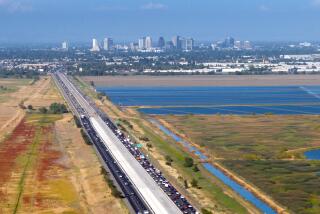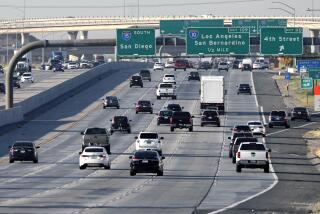Vroom! Texas considers 85 mph speed limit, nation’s highest
- Share via
WASHINGTON -- Everything is bigger in Texas, they say. Soon, it could be faster, too.
The Lone Star State could raise the speed limit on one stretch of highway to 85 miles per hour, the highest in the nation.
But don’t press the pedal to the metal yet.
The possibility of zooming down a 41-mile stretch of new toll road between Austin and San Antonio at 85 mph is revving up a debate about highway speeds that dates back at least to the 1970s when Congress imposed a national 55 mph speed limit (repealed in 1995).
State transportation officials caution they have made no decision yet. But the insurance industry is honking its concerns.
“If you’re looking at an 85 mph speed limit, we could possibly see drivers going 95 up to 100 miles per hour,” Sandra Helin, president of the Southwestern Insurance Information Service, said, noting that drivers often exceed the posted speed limit.
“When you get to those speeds, your accidents are going to be a lot worse. You’re going to have a lot more fatalities,” she said in an interview.
The possibility of an 85-mph speed limit has “received more attention than anyone expected,” said Peter Winckler, an aide to state Sen. Glenn Hegar.
Chris Steinbach, chief of staff to Texas Rep. Lois W. Kolkhorst, said lawmakers paved the way for the possibility of an 85-mph speed limit under the reasoning that “if future highways were engineered for safe travel at a higher speed, then the legal speed limits could be raised to reflect that road’s capability.”
The speed limit can be raised to 85 mph if officials determine the highway is designed to accommodate that speed and it is “safe and reasonable based on an engineering and traffic investigation,” according to a state Department of Transportation spokeswoman.
The debate comes after the Governors Highway Safety Assn. expressed concern earlier this year about what it said was the lack of progress in reducing the proportion of speed-related crashes. Although the number of crashes that involve speeding has dropped — along with overall traffic deaths — speeding continues to be a factor in about one-third of traffic deaths, according to the group.
But John Bowman, a spokesman for the National Motorists Assn. that was founded to fight the national 55 mph speed limit, said, “It’s a common misperception that when speed limits increase, drivers automatically compensate and go that much faster.”
“In fact, when speed limits are set correctly based on speed studies, the data show that travel speeds don’t change all that much,” he said. “The majority of drivers will not go faster than what they feel is comfortable and safe regardless of the speed limit.”
“Many highway speed limits are set too low for the prevailing speed of traffic,” he added. “Traffic studies seek to find the natural free-flowing speed of traffic. When speed limits are set at this level, vehicles move more freely resulting in fewer accidents and more efficient traffic flow.”
The maximum speed limit in the U.S. currently is 80 mph, on stretches of road in Texas and Utah.
ALSO:
Crews fight to fix leak, keep battleship Texas afloat
Auburn shooting suspect surrenders -- with snipers standing by
More to Read
Sign up for Essential California
The most important California stories and recommendations in your inbox every morning.
You may occasionally receive promotional content from the Los Angeles Times.











